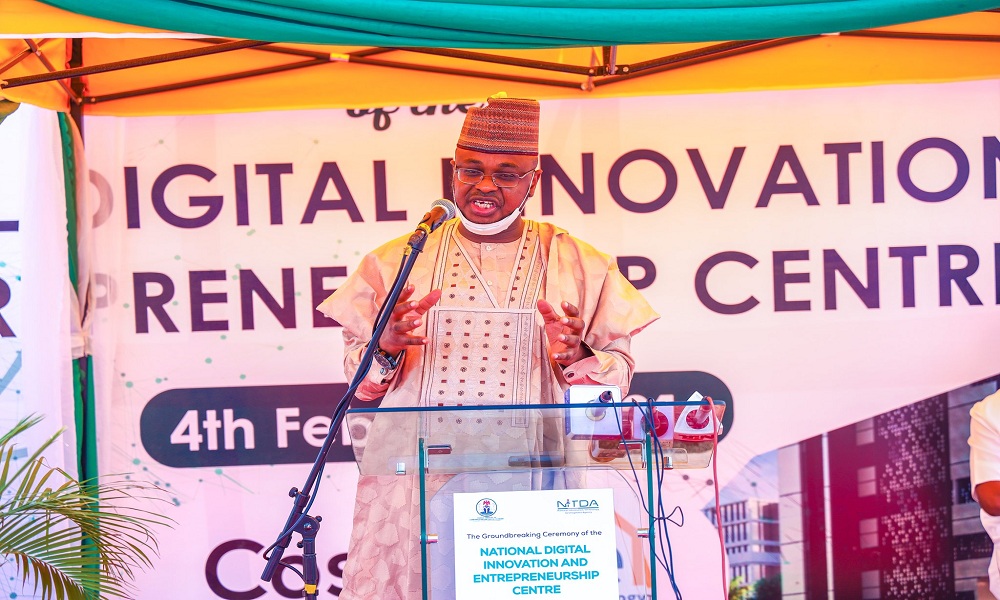Minister of Communications and Digital Economy, Dr Isa Ali Ibrahim (Pantami) has said that digital innovation and entrepreneurship have globally been recognized as two prerequisites for achieving an indigenous digital economy.
As a result, the minister said a successful digital innovation and entrepreneurship programme will support Nigeria in the development of her digital economy.
Speaking on Thursday at the groundbreaking ceremony of the National Digital Innovation and Entrepreneurship Centre, Abuja, Pantami said the centre aims to support Nigeria in her digital economy development.
“Our journey towards the development of Nigeria’s digital economy commenced with Mr President’s approval of our request to redesignate the Ministry of Communications as the Ministry of Communications and Digital Economy.
“Following the redesignation of the Ministry, we developed a National Digital Economy Policy for a Digital Nigeria (2020 – 2030), and this was graciously launched by Mr President on the 28th of November, 2019. The Policy outlines our vision for the development of Nigeria’s digital economy,” he said.
The minister noted that because high speed and affordable Internet connectivity serve as catalysts for innovation and stimulate the growth of the entrepreneurial ecosystem, the country was inspired to develop a Nigerian National Broadband Plan (2020 – 2025).
“For instance, the growth of the sector resulted in an increased contribution of ICT to Nigeria’s GDP, reaching an unprecedented value of 17.83% in Q2 ‘2020 according to the National Bureau for Statistics. We have also recorded an all-time high broadband penetration since the redesignation of the Ministry.
“In addition, we have also experienced great success in the development of other aspects of our digital economy. Over 120,000 Nigerians have benefited from our online digital skills program, with over 80,000 of them receiving one form of certification or another. This is even without taking the physical trainings into account.
“We have developed over a dozen policies aimed at providing the right environment to enable entrepreneurs to thrive in the sector. We are also developing National Policy on Digital Innovation and Entrepreneurship, which this Centre and many other centres all over the country will implement,” Pantami stated.
The minister noted that the groundbreaking ceremony of the National Digital Innovation and Entrepreneurship Centre was another giant leap towards the development of the nation’s digital economy and diversification of the country’s economy.
The Centre he said, will be based on the ‘live, work and learn’ concept, adding that the activities of the centre align with 6 out of the 8 pillars of the National Digital Economy Policy for a Digital Nigeria.
“These include Pillar #2 (Digital Skills), Pillar #4 (Service Infrastructure), Pillar #5 (Digital Services Development and Promotion), Pillar #6 (Soft Infrastructure), Pillar #7 (Digital Society and Emerging Technologies) and Pillar #8 (Indigenous Content Development and Adoption). We are also developing National Policy on Digital Innovation and Entrepreneurship, which this Centre and many other centres all over the country will implement.
“Our National Digital Economy Policy appreciates the importance of identifying and supporting Small and Medium Enterprises (SMEs) and it also focuses on encouraging many of these SMEs to go a step further by aiming to become Innovation Driven Enterprises (IDEs).
“The IDE-concept has been promoted by leading institutions such as the Massachusetts Institute of Technology (MIT) and these enterprises, no doubt, have great advantages. In contrasting IDEs and MSMEs we find that IDEs tend to have a global outlook while SMEs tend to start small and choose to remain local,” he said.
According to the minister, the Centre will among other things, enable Nigerians to acquire cutting-edge technological skills; enable Nigerians to participate in the development of hardware, software and emerging technologies; and create an innovative ecosystem.
It will also create a unique platform for technical skills (programming), soft skills (social interaction), entrepreneurship (starting and operating a business) to focus on the promotion and development of ICT, including smart energy solutions to drive ICT; and nurture new ideas and develop an inquisitive perspective to support in the creation of employers of labour.
Pantami added that the Centre will support in the promotion and development of ICTs, including aspects of advanced applied research; and allow startups to accelerate and experience innovations at scale, through customized visits, design thinking sessions and co-innovation workshops to create a highly collaborative and immersive environment.
The minister urged State Governments, the Organized Private Sector, Foreign Multinational Companies and High Net-worth Individuals to follow this example of the Federal Government and develop ICT innovation and entrepreneurship parks according to minimum standards NITDA will set, popularize and promote.
He commended the Director-General of NITDA, Kashifu Inuwa Abdullahi, for his great effort towards the implementation of the National Digital Economy Policy, adding that “NITDA’s role towards the digital innovation and entrepreneurship initiative is pivotal.”

